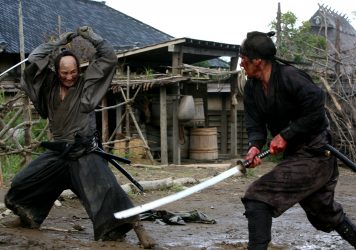Takashi Miike is up to his old tricks with this super samurai slaughter-fest.
Rivers of blood quite literally flow through Blade of the Immortal, Takashi Miike’s pristinely wacko adaption of Hiroaki Samura’s manga about a cursed samurai with a katana blade to grind. Never one to shy away from a good slaughter, the prolific Japanese auteur dials up the violence even by his high standards, orchestrating not one but two massive battles of attrition that a pit lone wolf swordsman against absurdly large numbers of disposable enemy combatants.
Challenging the time period’s conservative formality and tradition are dangerous characters decked out in wild costumes and accessories. These fringe personas give the film its singular sensibility; think Shogun-era melodrama possessed by George Miller’s The Road Warrior.
In typical Miike fashion, arterial spray washes over the very first frame. Duped by his corrupt superior into assassinating an innocent local official, disgraced samurai Manji (Takuya Kimura) retaliates with force, but his thorough reprisal has grave familial consequences. A showdown with violent bounty hunters seemingly gives Manji the brazen suicide mission he so badly craves, but the mysterious Yaobikuni (Yôko Yamamoto) salvages his ravaged body with regenerating bloodworms.
Fifty years later, Manji has accumulated countless more scars but nothing close to redemption. He lives on the outskirts of Edo, a town recently hit with attacks on traditional dojos by the subversive Itto-ryu, a new school of lethal fighters led by baby-faced Anotsu (Sôta Fukushi). One such strike leaves a young girl named Rin (Hana Sugisaki) orphaned and enraged. Eventually, she convinces Manji to help her enact vengeance.
With its momentary fits of comedy and noir banter (“It’s a perfect moon for last rites.”), Blade of the Immortal carves out a distinct identity in comparison to Miike’s self-serious period pieces (13 Assassins, Hari-Kiri: Death of a Samurai). There’s a specific looseness to the narrative that allows for past trauma to linger and the entire film feels haunted by regret. Because of this pervasive subtext, quiet moments between Manji and Rin are just as impactful as the grandiose fight sequences, which are admittedly brilliantly staged exercises in protracted carnage. The lengthy duration calls attention to the numbing qualities of cyclical violence, which Miike depicts as a relentless degenerative disease with inter-generational reach.
As if to invert the classic tropes and mad dog characterisations made famous by Akira Kurosawa and Toshiro Mifune’s Samurai films, Blade of the Immortal shrewdly skewers the idea that honour can be achieved through sacrifice and death. The pain Manji feels each time his body must regenerate is far more palpable than the countless head-shots and bludgeoning’s enacted during the insane final battle sequence involving an axe-wielding Anotsu and a legion of government conscripts. Thankless victories, no matter how hard fought, don’t get you any closer to transcendence, if such a thing even exists. But believing in (and fighting for) an empathetic ideal just might. It’s what separates good people from the barbarians.
Published 6 Dec 2017
A return to the Shogun-era for Japan’s most prolific auteur.
Miike relishes in the absurdity of endless violence.
This slice-and-dice epic has soul.

By Anton Bitel
Takashi Miike’s magnificent 13 marks both the end of an era and the boundary of a genre.

By Violet Lucca
Hou Hsiao-Hsien’s elegant martial arts tale is one the most beautiful films you’ll see all year.

Takashi Miike follows up his blood-pumping samurai blitzkrieg 13 Assassins with this talky and tiresome period drama.